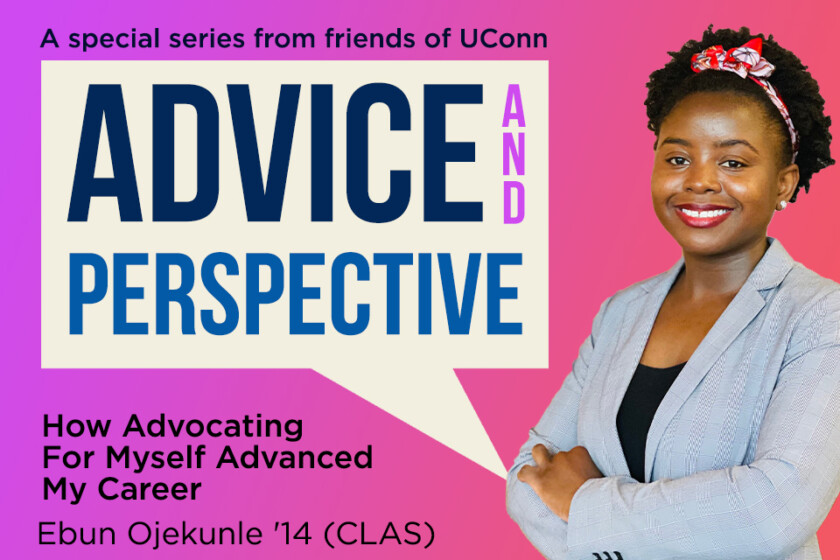
Ebun Ojekunle ‘14 (CLAS) explains how she has advocated for herself throughout her career and the positive effect of advocacy skills. She discusses salary negotiations, finding a mentor, asking for a professional training opportunity, and other valuable skills that students can practice now to prepare for future situations in their career. The questions and answers below are themes identified and summarized from Ebun’s responses to questions asked during the event.
How do I get involved in undergraduate research if I don’t have any research experience yet?
As a transfer student from a smaller university, Ebun was interested in the undergraduate research opportunities at UConn, a more comprehensive research university. She browsed the Chemistry Department website and investigated the faculty’s research for topics aligned with her interests. She emailed many professors inquiring about opportunities and heard back from two, one “no” due to lack of openings and one “yes.” She was excited and accepted the opportunity, and she went on to work in the same lab for two whole years. She prepared for this opportunity by taking lab work courses, so she had the foundational skills needed for research with this professor. On reaching out and asking questions, Ebun says, “it is important to not let the fear of rejection prevent us from taking a very important step in our career.”
How do I approach finding a mentor? What should I get out of a mentorship?
When seeking a mentor, Ebun recommends considering what you want to gain from the experience. Are you looking for career advice? Are you looking for an opportunity in a particular industry? Ebun also notes that although we generally gravitate towards people like us, physical identity similarities are not necessary to find common ground. Search for someone more advanced in their career than you are, as one goal of the mentorship relationship is for you to learn from their experiences. However, it shouldn’t just be a one-way street; you should offer your mentor support too! If they publish work, read it and share it. If they feel comfortable sharing, ask about their personal life and check-in with how they are doing.
What if I’m nervous to negotiate a job offer for an entry-level position right after I graduate?
Practice is key! The more practice you have, the more comfortable you will be. Ebun recounts the experience of being very nervous on the phone with the HR personnel when she countered their salary offer. But she didn’t let that stop her, and her counter-offer was accepted! She says particularly, “as minority students, it is easier to learn to advocate for yourself when the stakes are low than when the stakes are higher.” Practice can look like sending emails to your professors, asking for advice from upperclassmen, or scheduling a career coaching appointment. Ebun also encourages students to consider the activities they’re involved in on-campus and not dismiss the relevance of part-time and summer work in demonstrating their work ethic. Although you may not have industry experience yet, transferable skills such as communication, time management, and leadership are extremely valuable.
How do I prepare to advocate for myself at work? How specific should my request be?
Understanding what you want in your career, even if it is a short-term goal, will help you determine how to approach the situation. What kind of impact are you going to make with this question? Why do you think this opportunity would benefit you and the person you’re asking? Ask senior colleagues for their feedback on your potential request. If negotiating a salary offer, prepare to speak in-depth about the value you’re bringing. What are you bringing to this scenario that this company wouldn’t have without you? Ebun described a time at her previous job when a training opportunity arose, but her boss didn’t offer the opportunity to her, despite her qualifications. She prepared notes regarding why she was the best fit for the position and how it would benefit the company by increasing efficiency in the lab. Her boss was initially taken aback by this proposition but eventually accepted. Ebun notes that the response you receive might not be the perfect “yes” that you were hoping for, but still an excellent opportunity to have the experience you were seeking. Flexibility is important; consider the benefits of the altered scenario. She says, “If you don’t ask for it, the answer is definitely no. But if you ask for it, then the answer [could be] a yes or a maybe.”
As a last piece of advice, Ebun spoke on the importance of keeping an open mind. Here’s what she had to say: “The answer could come in different forms: it could be a yes, it could be a no, it could be a maybe, it could be not right now. And, I would say that when you get those answers, it is important to take a minute to analyze the situation and ask yourself what made you get the response that you got. You can also talk to your support network, your mentors, and your friends to get their advice and outlook for the reason for the response.”
The “Advice and Perspective from Friends of UConn” video series includes advice from alumni, recruiters, and more to provide guidance to UConn students. This video and blog featured Ebun Ojekunle ‘14 (CLAS), a Chemistry grad who works as an Analytical Scientist in drug safety R&D at Pfizer. If you’d like to learn more from other participants in this series, please explore other videos and blogs in the “Advice and Perspective” series here!
